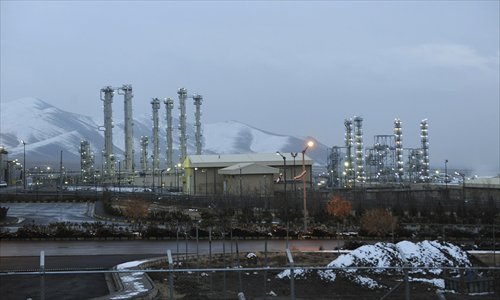Peaceful power
Iran, China to strengthen ties after nuke deal

Ali Akbar Salehi, vice president of the Islamic Republic of Iran, gestures in the interview. Photo: Li Hao/GT
Though Iran reached a landmark nuclear deal with world powers on July 14, many are still concerned about Iran secretly developing its own nuclear weapons in the future.
But during an exclusive interview with the Global Times, visiting vice president of the Islamic Republic of Iran stressed the nuclear weapons are not part of the country's defense doctrine.
"This JCPOA (Joint Comprehensive Plan of Action, the July 14 deal) has already closed all the possible pathways to the production of nuclear weapons," said Ali Akbar Salehi, who also heads the Atomic Energy Organization of Iran, of the deal.
"If we divert [from the deal], if there's any diversion, we can easily detect that diversion because there are inspectors and all kinds of means for inspection, it will be very easy to disclose any secret activity."
The West has often claimed that Iran has already diverted its nuclear production into non-peaceful projects, but Salehi said those accusations are not true, as Iran bought its initial centrifuging machines, which were already contaminated with weapons-grade uranium, from the black market.
"After three years when they did all the testing, because uranium has left fingerprints, you can always find where the origin of the uranium was, and it was not Iran," said Salehi. "We have never ever in our strategic defense doctrine included weapons of massive destruction as part of our weaponry."
Some sanctions on Iran are set to be removed after the implementation of the deal, but sanctions for military equipment, the missile industry and non-proliferation will remain.
The deal is currently being reviewed by the US and Iran.
Redesigning Arak
Under the new nuclear deal, the Arak heavy water research reactor, one of Iran's key nuclear facilities, will be modernized and rebuilt with the help of the P5+1 powers - the US, China, Russia, Britain, France and Germany.
The Arak reactor produces about 10 kilograms of plutonium per year. Salehi said the plutonium is not weapons-grade plutonium, but the West is still concerned.
"So we said OK, we're ready to remove this concern through redesigning Arak, so that it will produce less than 1 kilogram [of ] plutonium," said Salehi, adding that Iran has decided to sell extra heavy water to the international market.
"The Chinese have agreed to take a leading role in the working group that will work on the redesign and refurbishing of our Arak heavy water reactor."
Iran is seeking Chinese assistance to put up reactors of various sizes: small reactors of 100 megawatts and larger reactors that put out 1,000 megawatts. Salehi also underlines Iran's main desire is to look into the possibility of 100-megawatt reactors.
In the intermediate and long term, Iran is planning to build 8,000- and 20,000-megawatt nuclear power plants.
He also thanked the Chinese delegation to the Vienna conference and stressed the importance of strengthening the ties between the two countries.
"We trade with more than 80 countries in the world, but our first trade partner is China," Salehi said. "The volume of the trade between China and Iran is in billions of dollars not hundreds of dollars, this is going to expand because the removal of the constraints."
Iran is also among the partners of China's Silk Road Economic Belt initiative.

A view of Arak heavy water nuclear facility is seen near city of Arak. Photo: IC
Regional crisis
The security situation in the Middle East has deteriorated since last year, highlighted by the actions of the notorious Islamic State jihadist group who claimed numerous brutal killings and destroyed several ancient temples.
"Iran is the first country who took the lead in the region to fight Daesh," said Salehi, using an Arabic abbreviation for the jihadist group. "Iran looks on Daesh as an element that will jeopardize the security and tranquility and peace of west Asian region and Middle East."
"But unfortunately the West, despite the fact that they have taken so many positions and against Daesh, but they have not taken any practical measures that will render a blow to Daesh, it's all talk but no practical undertaking."
The Western powers have made joint airstrikes along with Saudi Arabia against the Islamic State, but is yet to carry out any ground attacks.
Reports suggested Iran supports the Houthi forces in Yemen, but the vice-president dismissed those allegations.
"Whatever happens in the world … they blame Iran," said Salehi. "It's because the challenges between Iran and the West, philosophical and political challenges."